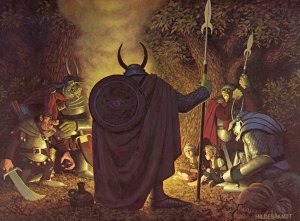
Wisdom and Winnowing (CaD Ps 49) – Wayfarer
When we look at the wise, they die;
fool and dolt perish together
and leave their wealth to others.
Psalm 49:10 (NRSVCE)
Over the past few years, I have watched, and assisted, as my parents’ lives have gotten significantly smaller in footprint. From a giant ranch home where grandchildren hung out together and spent a week each summer at “grandma camp,” to a townhouse, a two-bedroom apartment, and now a smaller apartment. With every subsequent move, there is a winnowing of life’s material possessions.
“Does anyone want this?”
“What should we do with that?”
“Somebody might use that. Let’s give it to the Many Hands Thrift Store.”
“Seriously. Nobody wants that. Throw it in the dumpster.”
Some time ago I was listening to a teacher who encouraged listeners to perform a virtual winnowing of life in your head. Think about everything you own. Not just the big items like homes, cars, and furniture, but the boxes of stuff in storage rooms, attics, and garages. Think about the collective contents of junk drawers, closet shelves, and storage bins. Having taken an exhaustive mental inventory, now consider where it’s all going to end up, and who is going to own it, when you die. Note: Someone else will own everything that doesn’t get pitched into the dumpster. And believe me, for many of us there will be a dumpster.
Today’s chapter continues a string of ancient Hebrew song lyrics written for a specific purpose. Psalm 49 is one of just two songs in the anthology of 150 songs written as “Wisdom Literature.” Across antiquity, sages throughout the Near East created proverbs, songs, parables, and literary works intended to teach and pass along wisdom.
As I shared in this chapter-a-day journey through the book of Proverbs (a classic example of “Wisdom Literature”), even in the Great Story wisdom is personified in a woman often referred to as Sophia. Wisdom Literature is typically marked by a calling out to or from wisdom as the songwriter does today in verses 3-4:
My mouth shall speak wisdom;
the meditation of my heart shall be understanding.
I will incline my ear to a proverb;
I will solve my riddle to the music of the harp.
The songwriter then challenges us as listeners and readers to consider the fact that rich-and-poor, wise-and-foolish, good-and-bad all end up in the same place and leave everything behind. Even the Egyptians who packed King Tut’s tomb with stuff for him to use in the afterlife only ended up lining the pockets of Lord Carnarvon and the displays of various museums.
Of course, Lady Wisdom calls out to me to think about this in relationship to what it means for me today, and I hear the echo of Jesus in my soul:
“Don’t hoard treasure down here where it gets eaten by moths and corroded by rust or—worse!—stolen by burglars. Stockpile treasure in heaven, where it’s safe from moth and rust and burglars. It’s obvious, isn’t it? The place where your treasure is, is the place you will most want to be, and end up being.
Matthew 19-21 (MSG)
In the quiet this morning, I hear Wisdom, Jesus, and Holy Spirit whispering to my soul. The exercise of virtual winnowing needs to lead me to actual physical winnowing, or else they have simply wasted their collective breath.













